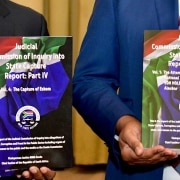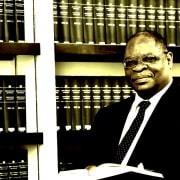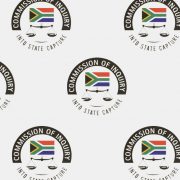|
Getting your Trinity Audio player ready...
|
Until South Africa learns to appreciate and applaud its whistle-blowers – those who take their courage into their hands and expose dubious deeds – the fight against corruption will not gain full momentum. Whistle-blowers provide an invaluable service to their communities and compatriots, by helping to uncover widespread or large-scale wrongdoing that affects other people. Thousands benefit from their bravery, whether it’s motivated by self-preservation, outrage and frustration, or true altruism, but the appreciation they get is disproportionately tiny.
Sadly, in this country, they’re more likely to be reviled than revered.
This World Whistle-blower Day, we reflect once again on the lack of a safe and supportive environment for our reporters of corruption. There are many people out there who have stories and valuable information to share, but they are deterred by weak law enforcement, the likelihood of intimidation, threats and victimisation, the danger to their families, and the sacrifice of their job, their health, or even their life.
“While it’s important to have strong laws that protect whistle-blowers, and our law – the Protected Disclosures Act – could do with some strengthening,” says Corruption Watch’s executive director David Lewis, “I think the most important way to protect whistle-blowers is to laud them and praise them and single them out for the heroes they often are.”
Whistle-blowers need to be recognised in a positive light, he adds. “They’re the ones that need to get the presidential medals. We may even want to consider offering them a share of the resources that their whistle-blowing manages to claw back for the state.”
It’s important that whistle-blowers are not treated as impimpis, says Lewis, and troublemakers, which they often still are when they try to find jobs again. Impimpis are police informers or those who betray their own, most often viewed in the context of apartheid South Africa – and the repercussions for such a person can be far-reaching.
“No one should suffer this way,” says Transparency International.
For this state of affairs to change, a nation-wide shift in mindset must happen, with a movement away from the culture of blaming the reporter. Only then will the pendulum shift from a small number of fearful whistle-blowers and a large number of perpetrators blithely going about their crooked business, to the opposite situation.
When promotions, or golden handshakes, or overseas trips become not the blatant proceeds of wrongdoing but rather the rewards whistle-blowers might look forward to, we will see them starting to come forward in bigger numbers. Even a heartfelt ‘thank you’ will be a good starting point.
“Whistle-blowing is one of the most effective ways to detect and prevent corruption and other malpractice,” Transparency International says. “The vital importance of whistle-blowers for our societies is regularly illustrated by the scandals they uncover – and the lasting change they help bring.”
Between a rock and a hard place
“If you witness any forms of maladministration or squandering of public funds, you have a responsibility to come forward and report it to the relevant law enforcement agencies … when you come forward with the information, it is the responsibility of the law enforcement agencies to protect your identity and to ensure that you and those close to you are not exposed to any harm,” says the same South African government that has for years paid lip service to its promises of rooting out corruption, until some recent positive signs, and whose Protected Disclosures Act falls somewhat short of effective protection.
According to the Ethics Barometer, a report published in 2020 by the Gordon Institute of Business Science (Gibs), 45% of respondents said they had witnessed some kind of unethical behaviour, but of those, just 30% said they had reported it.
“The two most common reasons given for not reporting,” says the Gibs report, “both clearly reflect a lack of trust – ‘I fear I’ll be victimised’ or ‘The company won’t take action; nothing will happen’.”
Respondents also noted that in some cases, the very person to whom they should be reporting the misdeed is the perpetrator. “Of the comments to do with Organisational Culture and Practices, 31% related to ‘speaking out’,” says Gibs. “Of these comments, as many as 66% referred to ‘actual or feared reprisal’ for speaking out.”
This is a dire situation. Torn between their legal obligations to report corruption and their fear of reprisals, they opt to say nothing, and South Africa is the poorer for it.
In an environment that is safe and secure for whistle-blowers, where the guilty do not continue to commit their crimes unpunished, and where those who expose them know that the law is adequately enforced, many more people will be prepared to come forward.
Supporting whistle-blowers is the duty of us all
In a year like 2021, Transparency International says, there is no doubt that corruption costs lives and threatens livelihoods. But by blowing the whistle, people who witness wrongdoing can help protect lives, public finances and the planet.
Corporate South Africa also has a role to play, says attorney Brenda Stern, who blew the whistle on corruption in her job in London in the late 2000s and for her trouble was eventually booted out of the company.
““My challenge to corporate South Africa is this: how many of you are prepared to say you are really committed to cleaning up our corporate culture?” she says in an interview with the Mail & Guardian. “Where are you, corporate South Africa, in terms of rewarding them? Whistle-blowing is an act of patriotism. Of public service. These are the people who are prepared to put their head into the shark’s mouth. We need to embrace, thank, honour and rehabilitate them.”
Without our whistle-blowers, we as Corruption Watch would not have been able to expose corruption in schools, or municipalities crippled by lack of governance, or poorly run home affairs offices that exploit refugees. Our interventions are a drop in the ocean, really, but they help to raise awareness of the various forms that corruption takes, and the stories of our whistle-blowers guide us to focus on topics of particular significance, such as land-related corruption, the appointment of top leaders in law enforcement agencies, and the struggles of mining-affected communities.








